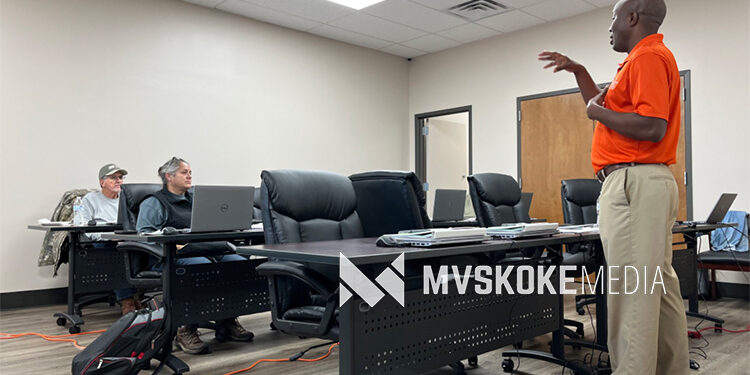OKMULGEE, Oklahoma – The Mvskoke Fund is wrapping up the Agricultural Business Training Series for citizens who applied for the Agribusiness Loan through the department. A series of five courses were held at various locations across the reservation, including the Mvskoke Fund Building in Okmulgee, River Spirit in Tulsa, Thlopthlocco Tribal Town in Okemah, Muskogee Indian Community Center in Muskogee, with the last session to be held back at the Okmulgee location on Feb. 8.
The course was open to all reservation citizens, but the grant is only available to members of a federally recognized tribe. The grant will fund Muscogee citizens state-wide and tribal members within the reservation.
Each individual learned how to operate FIN Pack Software and was provided with access specifically for farm and agricultural finance and accounting management. The software allows farmers to compare themselves to other farms of the same size and see where they stack up nationally.
Participants will be educated on developing a business plan, understanding cash flows, and estimating projections and other tools to help profits rise and reduce failing businesses.
Interim CEO of the Mvskoke Fund Robbie Deer said that the type they are seeing come in for agricultural loans is low-skilled in the business sector of the industry.
“What I’ve seen is pretty much just notes on paper, so the purpose is to bring this to a more formal level,” Deere said.
The goal is to help participants identify their needs when they may need help understanding where they could be having the most trouble when it comes to accounting.
“Many of them will come in not sure where they need help. They realize that they are having a struggle,” Deere said.
There are many risks to owning and operating a business; one of the most common outcomes is failing and becoming bankrupt.
Deere claims there is a difference with ag businesses.
“What we see with AG is usually it has been passed down or already have their hand in it. There’s a lot more legacy in it.”
Individuals sometimes start in agriculture, with the land passed down for generations.
Over the last two years, the MCN has built the Looped Square Meat Processing Facility and purchased a ranch where livestock is raised to supply the plant.
Deer said one client of the Mvskoke Fund provides livestock for the meat plant. Calling this client a prime example, no pun intended, of the success of the Mvskoke Agri-business grant.
Representative Mark Randolph is an ex-officio on the Mvskoke Fund’s board and even sponsored NCA 22-150, granting the department Native American Agriculture Fund Grant.
Randolph believes that using land for food sovereignty is essential.
He said, We regressed from food sovereignty and hopes the Nation will return to that.
For Randolph, it’s just a hobby now, but he claims he may again resort to using his love for gardening and the outdoors to feed himself and his family. Growing up, he remembers eating straight out of his grandmother’s garden. Even now, he loves to plant things here and there around his home.
“You look at the prices of vegetables and eggs,” Randolph said. “I better get some chickens again.”
Deere and Randolph both agreed that this could be a way to innovate jobs and food sovereignty for the Nation.
“There is a lot of area for agricultural expansion and livestock services that citizens can benefit from long-term,” Randolph said. “Especially those that have land, we have to look at ways to use our excess land,”
Randolph said this program and the meat plant could complement each other while recycling money and keeping it within our community.
“We have a ways to go,” Randolph said. “But this is a good start.”
With courses of this nature, the Mvskoke Fund can determine the needs of the participants by collecting data and information, creating more funding opportunities.
For more information, call the Mvskoke Fund at 918-549-2603.





